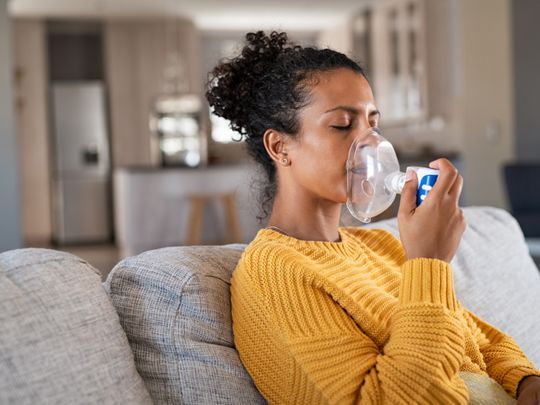
Dubai: As a dust squall blows over many emirates and humidity levels rise and the air is thick with allergens such as pollens and silica, chronic asthma patients fear it may trigger a respiratory distress. In times of the COVID-19 pandemic, while wearing face masks has brought down the incidence of allergic asthma attacks, doctors advise chronic patients to exercise extra caution to prevent COVID-19, which could exacerbate their respiratory distress.
What is asthma?
Dr Julio Gomez-Seco, lead consultant in pulmonology and sleep respiratory medicine at the Fakeeh University Hospital, Dubai, explained: “Asthma is a chronic inflammatory disease of the airways and according to the World Health Organisation (WHO) an estimated 300 million people suffer from it, worldwide, which impacts quality of life and productivity. It is also responsible for 500,000 fatalities worldwide annually.”
Asthma in the UAE
According to the National Centre for Biotechnology Information (NCBI) United States, in the UAE, while there has been no reliable data on its incidence, a 2009 survey conducted on 1,220 randomly selected residents showed the prevalence of asthma in about 146 patients. This represented 12.1 per cent incidence in the sample. Moreover, of those identified with asthma, about two-thirds reported having sudden and severe attacks, which impacted the productivity of their lives.
Difference between asthma and COVID-19 symptoms
Since both conditions affect the respiratory system, doctors say that many asthmatics may get their asthma attacks due to COVID-19 symptoms. However, they need to be assured that all breathing issues cannot be attributed to COVID-19 affliction.
• Wheezing, coughing and chest tightness becoming severe and constant.
• Feeling breathless with inability to eat, speak or sleep.
• Rapid breathing.
• A faster rate of heart beat.
• Drowsiness, confusion, exhaustion or dizziness.
• Blue lips or fingers due to lack of oxygen.
• Fainting.
Patients need to know that while COVID-19 patients do have difficulty in breathing, yet, it happens only if the oxygen saturation falls. They first have fever, dry cough and extreme fatigue. However, in the case of an asthmatic attack, the symptoms occur as soon as it is triggered.
Many triggers for asthma
Dr Gomez-Seco said: “Not all allergies lead to asthma, although certain types of asthma are triggered by an allergy. A chronic asthma patient is prescribed a series of medications that include nasal spray, a cortico-steroid inhaler to prevent inflammation of the respiratory tract and a broncho-dilator medicine that prevents constriction of the bronchial tubes in case of any attack. The best prevention is to take the prescribed medication regularly.”
Asthma triggers inflammation and constriction of bronchioles
Dr Saheer Sainalabdeen, specialist in respiratory medicine at Medeor, Dubai, explained: “Asthma patients do panic as they are not sure whether the symptoms they are experiencing is due to their chronic condition or whether they have contracted COVID-19. All respiratory illness viruses affect the upper or the lower respiratory tract. Asthma affects the bronchial tubes that facilitate the external air going into the lungs as these get constricted. In COVID-19 impacts, the alveoli — tiny air sacs in the lungs — get filled up with secretions, making breathing difficult. However, one can complicate the other and therefore the first thing Asthma patients need to keep in mind is to strictly follow their medicine protocol — even if they are feeling fine.
Are asthma patients more likely to be affected by COVID-19?
Dr Gomez-Seco said: “There isn’t any evidence to show that asthma patients are at a higher risk of catching the COVID-19 virus, but they need to be more careful when they test positive as any respiratory virus can exacerbate their condition. Just as patients of asthma take precautions to avoid any potential environmental triggers, they need to be extra careful about wearing the mask, practising social distancing, hand sanitising and all other hygiene protocols to reduce chances of infections.”
Vaccination
It is important that patients of controlled asthma get vaccinated, said Dr Sainalabdeen. “Controlled asthma means patients who have managed to minimise their attack with regular medication. Those who can get attacks without any known triggers are said to have uncontrolled asthma and these individuals need to take the vaccination under their treating physician’s guidance.
Dos and Don’ts for asthma:
• Avoid stepping out in squall and dust.
• Wear your face mask at all times when stepping out and even while indoors, while cleaning or reaching out for a book or object on a dusty shelf.
• Minimise fabric curtains, carpets that tend to attract dust in their fibres.
• Service the air-conditioning duct regularly, especially during the change in season. Keep the room temperature above 22 degrees as anything colder than that gives a change to fungus and moulds to thrive.
• Keep a dehumidifier at home to reduce humidity levels indoors.
• Avoid keeping pets or even stuffed toys at home. Dander from the fur and skin shed by your pet and dust trapped in stuffed animals can easily be a trigger for asthma.
• Keep stress levels low with breathing exercises as stress is a known trigger for an asthmatic attack.
• To minimise the chance of COVID-19 transmission, get vaccinated.
— Source: Dr Julius Gomez-Seco and Dr Saheer Sainalabdeen










